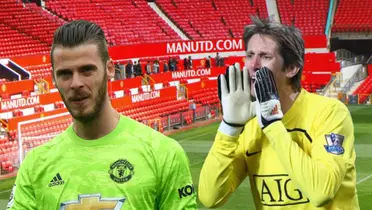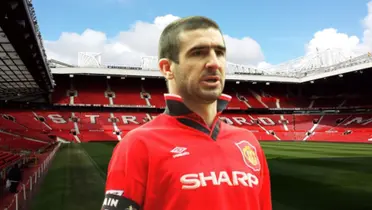He has let himself and his family down," ex-Man United player expresses disappointment with Garnacho
The Argentinian player is in two minds about staying or leaving in the summer transfer window.
By Axel Reyes

Paul Parker, the former Manchester United defender, has ignited a debate with his recent comments about young star Alejandro Garnacho. Parker's assessment of the Argentine winger has been particularly scathing, raising questions about Garnacho's development and attitude.
Parker's comments, "I liked him when he came through and he had that Argentinian fire in his belly, which he has lost completely. He has let himself and his family down. He has let his club down, because he is not taking advantage of the talent he was supposed to have," have sent shockwaves through the footballing world.
Garnacho's Emergence
Alejandro Garnacho burst onto the scene at Manchester United with a series of electrifying performances. His pace, skill, and direct attacking style quickly made him a fan favourite. Garnacho's early displays were characterised by a raw passion and a fearless approach, leading many to believe he was destined for greatness.
Parker's Critique
Parker's critique centres on the perception that Garnacho has lost the hunger and drive that initially propelled him into the spotlight. He suggests that the young player has become complacent and is not fulfilling his potential. The accusation that Garnacho has "let himself, his family, and his club down" is particularly damning, highlighting a perceived lack of professionalism and commitment.
Argentinian Fire
Parker's reference to Garnacho's "Argentinian fire" alludes to the passion and intensity often associated with Argentine footballers. This "fire in the belly" is seen as a crucial ingredient for success, driving players to push themselves to the limit and overcome challenges. Parker's assertion that Garnacho has lost this fire suggests a decline in his work ethic and desire.
Debate and Discussion
Parker's comments have sparked a lively debate among football pundits, fans, and former players. Some have defended Garnacho, arguing that he is still young and developing, and that criticism of this nature is both premature and damaging. Others have sided with Parker, suggesting that young players need to be held accountable and that constructive criticism can be a valuable tool for growth.
The Pressure of Potential
Young footballers who demonstrate exceptional talent often face immense pressure to live up to expectations. The weight of potential can be overwhelming, and some players struggle to maintain the focus and dedication required to consistently perform at the highest level.
Managing Young Talent
The management of young talent is a delicate balancing act. Clubs and coaches must provide support and guidance while also instilling discipline and a strong work ethic. Striking the right balance between encouragement and criticism is crucial in shaping the development of young players.
Garnacho's Response
Garnacho's response to Parker's criticism will be crucial in determining his future trajectory. Whether he uses these comments as motivation to reignite his passion and prove his doubters wrong, or whether he allows them to negatively impact his confidence, remains to be seen.
More news

Onana Exit Rumors Swirl: How the Goalkeeper Is Responding
30/03/2025

Eriksen breaks the silence about the rumors of not renewing
30/03/2025

World-Class Player Available: Romano Reveals Transfer Bombshell
30/03/2025

Ugarte's Premier League Insight: Key Differences From Ligue 1 Revealed
30/03/2025

Ekitike's Staggering Stats: Why Man United Are Keen
29/03/2025

Beyond Legends: The United Player Who Rewrote Investment History
29/03/2025

Manchester's Goalkeeping Giants: Who Reigns Supreme?
29/03/2025

Fernandes' Fortune: Unveiling the Price Tag of United's Captain
29/03/2025

The Manchester United jewel that was rumoured for Barcelona ended up in an exotic league
29/03/2025

Father's Faith Pays Off: 100 Pound Bet on Son's United Debut
29/03/2025

Community Concerns: Old Trafford Neighbours React to Stadium Plans
28/03/2025

Ferdinand's Hilarious First Day: Training Ground Antics Revealed
28/03/2025

The millions that Manchester United would earn by getting rid of Andre Onana
28/03/2025

Mata's Verdict: Former United Star Picks His GOAT Between Messi and Ronaldo
28/03/2025

United's Lost Gem: The Player Who Became a Decade-Defining Star After Leaving Old Trafford
28/03/2025

Giggs's Tears: The Sole Moment Football Moved Him to Cry.
28/03/2025

Nani's Unforgettable Ride: The Silent Car Journey with Sir Alex Ferguson
28/03/2025

Cantona's Iconic Collar: Unveiling the Mystery Behind the Up-Turned Neck
28/03/2025




